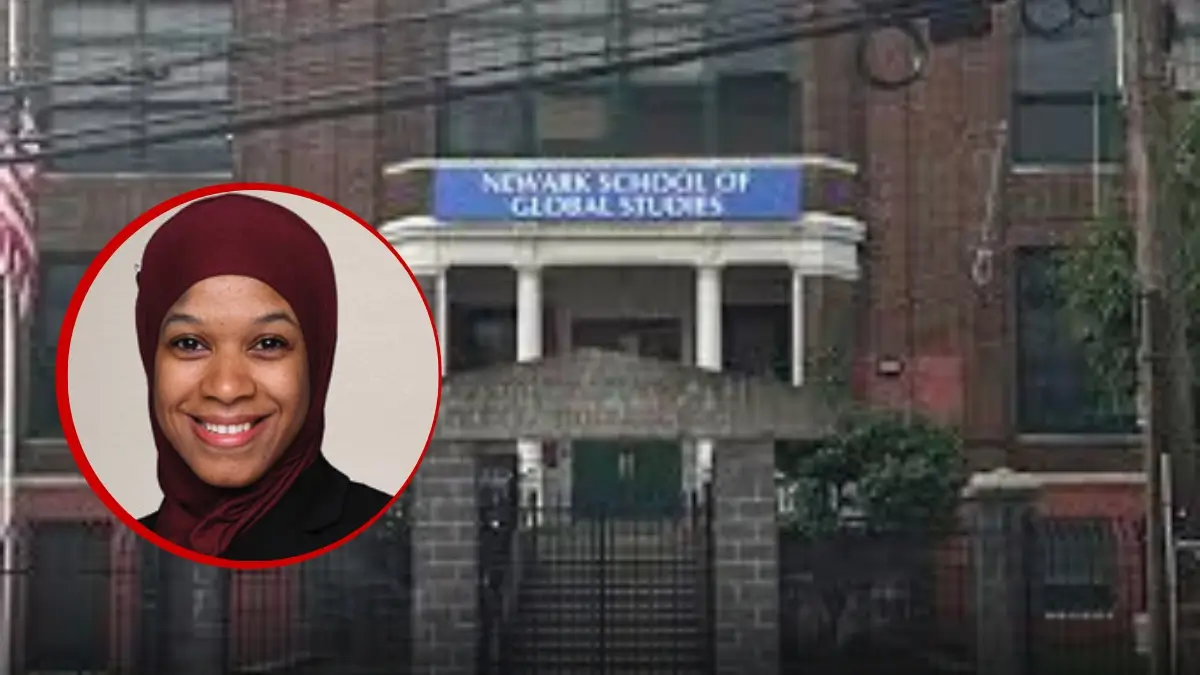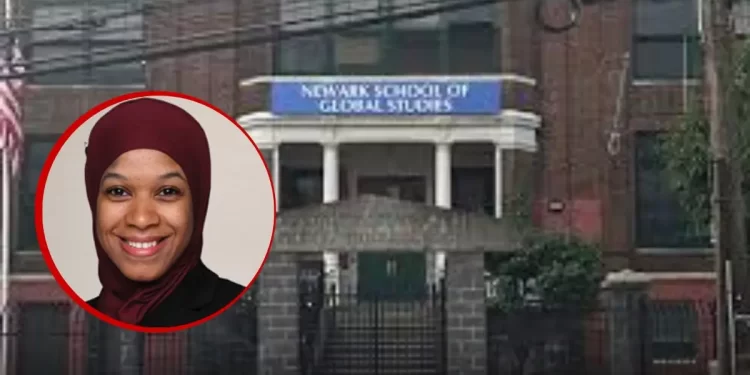A leaked report commissioned by the Newark school board to look into anti-Black racism at its magnet high school focused on global business and diplomacy reveals that Black students and teachers have endured racial epithets and acts of bigotry since 2020 from the school’s predominantly Latino students, with inconsistent and ineffective responses from the school’s staff.
The Newark school district has fought to block the public from viewing the report assessing how it has handled outcry about racial harassment of Black students at the Newark School of Global Studies for a year and a half. A draft version of the report, dated May 2023, was obtained by Chalkbeat Newark and published this week.
The probe into racism at the school, conducted by Creed Strategies, a consulting firm focused on educational and racial justice, was initiated after Black students spoke out at a series of Newark Board of Education meetings about racial slurs and incidents they had faced and their frustration over the school’s failure to investigate and discipline the students responsible.


In November of 2022, Black student Terril Coley told district leaders he had been called “smart chimpanzee” in his English class and that his classmate, Akela Haynes, who is Black and Muslim, had been called the N-word and “terrorist” by Latino classmates while walking down the hall. Another student said he was called “a slave.”
David Allen, a Black student who was then the school’s student council president and the founder of its Black Student Union, told Chalkbeat that Haynes, who was his best friend and an honor roll student, had left the school due to the ongoing racism she experienced. Allen himself transferred out in 2023.
Coley also later transferred to another district school. His mother, Brenda Brown, told the school board that it took days for the school to contact her regarding the “chimpanzee” slur directed at her son and then nearly three weeks before the offending student was suspended.
Other Black students and parents complained that the administration wasn’t taking the racial incidents seriously enough and that disciplinary enforcement was lax.
Superintendent Roger Leon promised students and parents at the board meeting that he would fix the problems.
Allen told Chalkbeat that a group of students in his history class made racist jokes about blackface, lynchings and Black stereotypes in violation of the district’s harassment, intimidation and bullying policy, but faced no consequences.
Allen and four of his friends then compiled audio recordings of students using racial slurs during class and listed instances when Black students faced harassment, and reported it to the school’s vice principal, Hoda Abdelwahab, who promised to investigate, he said.
But the harassment by the same group of students continued, and Allen said that when he met with administration officials several months later, they claimed they knew nothing about the racist incidents the Black students had shared with the vice principal.
“So, this is kind of a pattern with them,” Allen said. “They’ll pretend they’re going to do something, and then kind of just sweep it under the rug and pray for the best and hope it goes away.”
After Black students made more public comments about the continuation of racial incidents at the school and their feelings of isolation, frustration and anger at school board meetings in December of 2022 and January of 2023, complaints well publicized by local media, the district commissioned the review of the school’s race and culture issues.
The evaluation took months to complete as reviewers at Creed conducted classroom observations and extensive interviews with staff, teachers, and students. The firm reviewed a range of metrics, including enrollment, attendance, test scores and suspension rates.
The draft report leaked this week said that Black students at Global Studies told consultants they were regularly called the N-word by Latino students, as well as other racial slurs, including “monkey” and “Black b-tch.” Latino students also used vernacular phrases such as “bruh” and “Wakanda Forever” in “derisive and mocking ways.”
In January of 2023, a student reportedly made threats to “take off” and “stomp on” the hijabs of two Black and Arab Muslim women teachers but faced no discipline.
The consultants found that the school “did not act quickly or consistently to [address] racist, bigoted and biased incidents in ways that communicated the seriousness of the acts … and served to alleviate the suffering of those that experienced racial harm.”
It noted that the school’s progressive discipline policy and restorative justice approach resulted in fairly light punishment for student offenders, who faced consequences including writing apologies, parent conferences, counseling, class detention and, in only a handful of cases, in- and out-of-school suspension.
“Black students and stakeholders began to feel emotionally unsafe about being forced to work with students who used racist language toward them but were allowed to remain in classes and the school,” the report said.
An 11th-grade student said the lack of punishment contributed to the frequency of racial incidents.
Despite being told “a million and one times …to stop being racist,” the non-Black students “have been running rampant saying the N-word” and other slurs but faced no punishment, the student said. “Not anything. Not a suspension. Not an expulsion. Nobody was made an example. … And teachers would say nothing about it.”
Some of the teachers and other adults at the school described the Black students’ experiences and descriptions of racial incidents as “exaggerated and irrational, dismissive reactions that eroded trust between students and adults,” the report noted.
Reviewers found that some Latino students who used racial epithets and expressed anti-Black sentiments would deflect their significance by claiming they were kidding around or that they identify as Black.
“Importantly, no Latino or other non-Black student denied their Black peers’ experiences or accused them of exaggeration, the report said.
Black students were further alienated by school assemblies organized by school and district administrators to address their concerns, the consultants found.
The school principal, Nelson Ruiz, held an assembly for the entire school where he told all students not to use the N-word or they would be suspended. “The zero tolerance for the n-word not only was viewed as harming victims,” the report said, “but it also policed the language and speaking practices of Black students.”
Leon, the district superintendent, held an assembly for the junior class where they were told, “If they don’t feel comfortable [at Newark Global Studies], basically they can leave,” the report said. This was interpreted by many students as, “If you don’t like it, you can leave,” and seems to have catalyzed several Black students to transfer out of the school, as well as a few Black teachers.
When Global Studies opened in September 2020, students and parents had high hopes it would deliver on its mission to be “a place where a diverse student body will converge in a school with no borders” and “foster fluency in a second language [Mandarin or Arabic], immersion in foreign culture, and exchange of ideas via advanced technology.”
At its ribbon-cutting ceremony, Leon said the school would provide each student with “a passport to see the world you were destined to lead.”
The school is located in a predominantly Latino neighborhood of Newark, which has a total population of 307,000 that is 48.2% Black and 36.8% Latino, or Hispanic, according to July 2021 Census estimates.
In its first year, Black student enrollment at Global Studies was 31 percent, almost half that of Latinos (64 percent), the report noted. But in each subsequent year Black student enrollment has decreased. In the 2022-23 school year, Black students comprised only 23 percent of the 290-student body, while Latino students made up 74 percent.
The transfer rate of Black students from Global Studies was disproportionately higher than at other themed high schools compared in the review, including Newark’s Vocational, Data Science and Fashion and Design high schools, according to the draft report.
As a result of how the school responded to racist and racialized incidents, the report said interviewees reported increased emotional and psychological stress that affected their attendance and took a toll on their ability to learn.
“The school slowly went from being held on a pedestal, first place, ‘oh I’m going to love it here,” to ‘I don’t want to be here. I’m tired,’” one student told the consultants.
Black teachers have also left Global Studies at a faster rate than their Latino, Asian and white colleagues. In the 2022-23 school year, 50 percent of Black teachers and administrators stayed, compared to 66 percent of Latino, 75 percent of Asian and 86 percent of white faculty and staff.
The report found that administrators “are perceived as ignoring or scapegoating teachers” and that professional development activities “do not align with staff members’ needs for learning about the impacts of history and systemic racism and creating culturally responsive-sustaining learning.”
Two Black teachers at the school who claimed they were subjected to racial harassment and hostility resigned and filed legal claims with the state Division of Civil Rights, reported Chalkbeat. They have since sued the district in a lawsuit filed in Superior Court of Essex County that alleges school and district leaders created a hostile work environment where they experienced racial discrimination and retaliation. That lawsuit is ongoing.
While members of the public and the teachers union have clamored (and sued) for the release of the report for almost two years, Leon said it would be treated as an internal document to guide the development of the district’s strategy on race and its corrective action plan, which have yet to be implemented.
In September of 2023, the district shared limited information about a few of the recommendations outlined in the report, which included that Newark schools must assess how “anti-Blackness beliefs” impact existing school systems and practices; create a school culture where issues of race and culture can be discussed openly and are integrated into school instruction; and commit to “culturally responsive-sustaining education transformation” that develops the ability of all school staff to identify cultural gaps in their knowledge, practices and skills.
The district withheld Creed’s other findings about racial and religious harassment incidents at the school and the many concerns expressed by students, parents, and teachers about how school officials were handling it. (Despite the recent publication of the draft report, the district refused to release the most recent version, calling it “privileged and confidential.”)
“It was traumatizing to read,” school board vice president Dawn Haynes said after reading the report, which was shared with some board members in 2023. Her daughter Akela was among those who transferred out of the school due to the ongoing harassment she experienced. She is now 18 and a freshman at Clark Atlanta University.
“Those students and staff that were affected by the environment at the School of Global Studies show a deeper concern with America as a whole with racism and separation that should never be tolerated in any school,” said Haynes.
Since then, the school board has attempted to oust Haynes, whose daughter filed a legal claim against the school in October, alleging religious, racial, and gender discrimination and harassment that caused her physical and psychological harm. The board claims Haynes now has a conflict of interest that could harm the district.
In December, a state administrative law judge disagreed and rejected the board’s effort to unseat Haynes. The state’s commissioner of education will issue a final decision in February.
Under state law, after filing a tort claim, an individual must wait six months to file a lawsuit to give a public entity a chance to respond. Akela Haynes sent her claim to Newark Public Schools on Oct. 25. She said she intends to sue in order to bring more transparency about the discrimination she says that she and her peers experienced at Global Studies.







